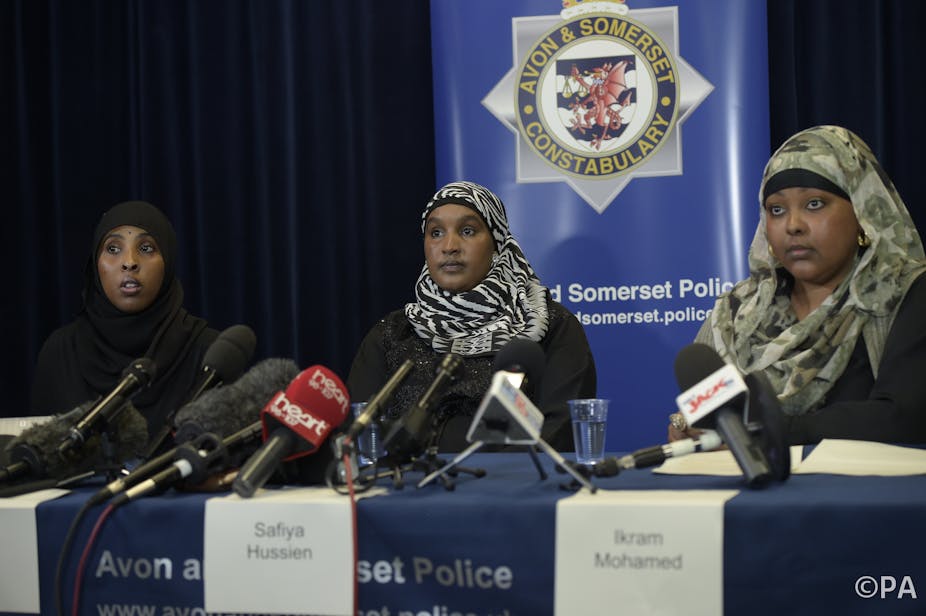On the morning of September 24 2014, 15-year-old Yusra Hussien left for school near her home in Easton, Bristol. She then disappeared. News reports surfaced a few days later that Yusra and a 17-year-old friend from London had reached Istanbul, fueling speculation that the two young women were heading for Syria to join Islamic State.
Terms such as “brainwashing” and “radicalisation” were repeatedly and casually invoked to explain Yusra and her friend’s actions. Understandable enough; how else to explain the uncharacteristic folly of a model student who was described by her teachers as “calm and collected”?
The problem is, it’s just not that simple.
Weasel words
Suggestions of brainwashing or radicalisation imply that the object of such efforts has been profoundly diverted from their usual, reasonable way of thinking. The instigators of this mental trickery are implicitly credited with considerable psychological skill, while the target is simultaneously assumed to have some mental insufficiency or vulnerability.
This may be a lack of agency, an inadequate understanding of the issues at stake, or just “weakness of mind”.
The young are commonly deemed to be easy prey for those seeking to enlist them for a “radical” cause. Indeed, children and young people’s engagement in oppositional politics has often been explained away by reference to their supposed psychological immaturity. Outside of state-sanctioned exceptions (such as allowing 16 and 17-year-olds to vote in the Scottish referendum), political engagement by minors is liable to be dismissed as the product of mental or physical coercion, the incapacity associated with immaturity, or a combination of both.
The response from police, educators and political figures to protests by school students at the planned invasion of Iraq in 2003 illustrates the assumption of immaturity. Rallies held in various cities around the UK and in Parliament Square were uniformly depicted as the acts of “truants” who lacked “the experience to really understand the full ramifications of what they are talking about.” But the same truants’ reflections ten years on suggest these rallies were profoundly meaningful events for them, offering a real expansion of their political outlook and experience.
Similar, equally lazy assumptions still inform much of the debate around child soldiers, which has been raging since the late 1990s.
The push to end the recruitment of under-18s for military action has spawned academic studies, human rights reports, advocacy campaigns and measures adopted by the United Nations, including an Optional Protocol added to the UN Convention on the Rights of the Child that raised the minimum age of involvement in combat from 15 to 18. And yet, these initiatives have rarely paid serious attention to the reasons why the young might engage in military action. The underlying assumption, as usual, is that this is generally the result of some kind of coercion.
While horrific cases of kidnapping and intimidation undeniably continue to occur, detailed investigation of specific settings and even accounts from former underage soldiers reveal a more complex reality. Around the world, young people join military groups or engage in less organised political violence with diverse motives; they act out of self-defense, a sense of justice and revenge, or support for “community” - construed at local, national or transnational level.
Double standards
This unwillingness to seriously consider why children might engage in armed hostilities is a relatively recent phenomenon. It is also liable to come into play more particularly when the minors concerned fight for causes we deem objectionable.
A century ago, the estimated 250,000 boys who volunteered to fight for the British Army were hailed by newspaper editors and political leaders as heroes and patriots, not dupes or truants. The role of black South African schoolchildren in the struggle against Apartheid was scarcely pathologised or belittled.
The fact is that in a great many societies, teenagers under the age of 18 are still considered capable of reasoned choice about enlistment and involvement in political violence. But elsewhere, the assumption of incapacity offers former combatants deemed “children” a shield from the punishment meted out to their “adult” comrades and seniors. Arguing instead that a 15 or 16-year-old is able to make a reasoned choice about engagement in hostilities risks exposing that young person to the full force of the law.
On the other hand, using loose, inadequate concepts such as brainwashing and radicalisation to explain young people’s engagement in political violence carries its own risks. It severely limits our ability to understand why young people are mobilised in support of a group such as Islamic State, and hinders intelligent debate about the wider changes needed to prevent them doing so. Moreover our efforts to reintegrate them once they come back are likely to prove desperately inadequate.

